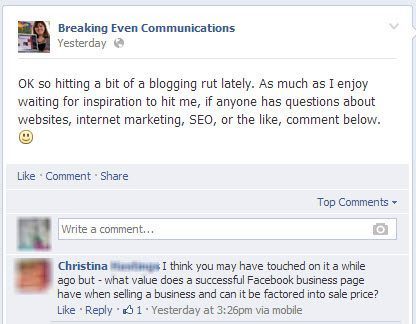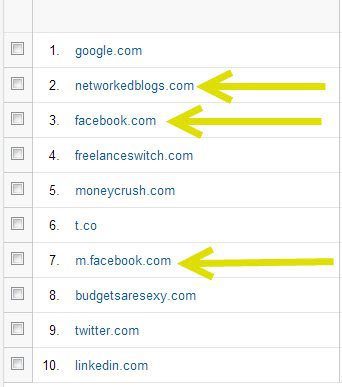Our friend Christina asked an awesome question on Facebook:
As someone who has had a business valuated, I understand there is way more than one way to quantify how much a business is worth and that each way can be seen as valid. Rather than using one formula, it might be wise to average a few.
Similar to this, I’ve seen Facebook fans being valued anywhere from $0.50 to $1000+, depending on the product being sold (the $1000 one was a bit of high end software).
But let’s try two ways for fun to valuate fans, using the Breaking Even page as an example.
Option A: How much traffic is it driving to your website? Do these visitors convert?
This calculation says, how many people came from Facebook (who otherwise might not have come) and what was their purchasing power.
Why is this good? It looks at who got to your website and regards Facebook as a marketing tool to get people there.
I went into Google Analytics and looked at what drove the most traffic to BreakingEvenInc.com over the last two years. Here’s what I found:
Three of these are Facebook (the first one is the app that pulls our blog automatically into Facebook).
So let’s go to each source and see if people get to one of two pages I want them to get to: 1) contact or 2) schedule meeting.
Here is what I see when I run the numbers:
296 contact visitors got to the contact page from Facebook (combined from the 3 sources).
240 schedule meeting visitors got there from Facebook (combined from the 3 sources).
Now if I look at the success rate of each of those forms we can get some better numbers.
1% of visitors fill out the contact form and 1.7% of visitors fill out the book meeting form according to analytics so…
296 x .01= 2.96 people filled out the contact form from Facebook (let’s call it 3)
240 x .017= 4.08 people filled out the schedule meeting form from Facebook (let’s call it 4)
So 7 people got to the website from Facebook and bought something: consulting time, a website, social media marketing…could be anything. If our average customer is valued at $500, that means Facebook generated $3500 of revenue for us via our website in the last two years (or $1750/year).
When you valuate a business, it’s usually earning power over the course of about five years so let’s say this rate was steady, that would value this Facebook page (if it was maintained at the current rate) at $8750 ($1750 times five years).
Value from this scenario: $8750
Option B: How many of your fans are customers who have actually purchased something? What is their average spend?
This one is way more time consuming to run.
Looking at our actual Facebook fans and their spending power is different than Option A because it treats Facebook as its own community, not just a tool to get people to your website. We can also argue this looks at the idea of repeat customers a little more closely.
At the moment, we have 463 fans and, for the sake of this exercise, I went through and assigned a monetary value to each actual customer that has spent money with us.
Total fans: 463
Number of fans that are actual customers (versus friends, relatives, or general well wishers): 60
Number of those 60 fans who have only ever spent $25 with us: 20 (1/3)
Number of repeat customers (more than one invoice in Quickbooks): 42 (70%)
OK so our social media customers are repeat customers, even if not a large part of our fanbase. But what is the average value per customer we have on Facebook? If you take the total these 60 customers have spent (ranging from $25 to $10,000, the total was $62,950) and divide that over the 60 customers:
Average Facebook customer: $1,049.17
These are people who actually spent money. And if we divided the total revenue over all the Facebook fans (including the friends, relatives and well wishers who haven’t bought from us yet):
Average Facebook fan value: $135.96
The $10,000 customer throwing you off? Let’s take that number out of the equation and make it 59 customers who have spent a total of $52,950.
Average Facebook customer: $897.46
Average Facebook fan value: $114.36
(Aside: Now our average customer is probably worth more than yours if you sell, say, ice cream or t-shirts. But if you went through your Facebook fans with your staff- even a random sampling of them- and assigned an approximate value per customer, you could run similar calculations and figure out how much your average Facebook fan is worth. You might have more fans that are worth less but that is still valuable!)
Is there a way to export your fan list? Not easily but it can be done theoretically: http://www.agorapulse.com/blog/why-export-your-facebook-fans I just sat here and made the list the copy and paste way.
So the page valuation (in my opinion) would be to take the amount of repeat customers (in our case 42) and multiply that by the average Facebook fan value (we’ll use the lower one):
42 x $114.36= $4,803.12
Value from this scenario (on the low end): $4803.12
Ideally, the longer you’ve had Facebook, the better of an indicator this is. Also, just like with any valuation formula, running a few different ones will give you a picture.
But to be fair, you need to subtract the time it took for you or an employee to maintain the account, since that was a cost.
So Facebook value – time to maintain = true value of Facebook page (While I think it’s a bit nosy to go into how I pay myself, I will say with both valuations if I subtract my time, I am still in the black, though barely for that second lower one)
Now the price of anything is really what someone is willing to pay for it so this is subjective. But bringing some well reasoned numbers to the table will make the person buying your business think of this asset as being much more valuable than they were probably originally thinking.
And looking at Facebook as both a way to get buyers to your website and a way to engage a community of customers is a more complete way to think about this asset, or at least begin the conversation with the person buying your business.


